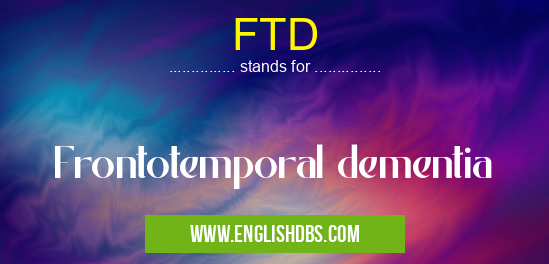What does FTD mean in SYNDROMES
FTD (Frontotemporal Dementia) is a degenerative brain disorder that affects the frontal and temporal lobes of the brain, leading to a decline in cognitive, behavioral, and language abilities. FTD is a type of frontotemporal dementia, which is a group of disorders that affect the frontal and temporal lobes of the brain.

FTD meaning in Syndromes in Medical
FTD mostly used in an acronym Syndromes in Category Medical that means Frontotemporal dementia
Shorthand: FTD,
Full Form: Frontotemporal dementia
For more information of "Frontotemporal dementia", see the section below.
Symptoms of FTD
- Behavioral changes: These may include disinhibition, lack of empathy, impulsive behavior, and apathy.
- Cognitive changes: These may include difficulty with language, planning, and decision-making.
- Motor changes: These may include difficulty with coordination, balance, and speech.
Diagnosis of FTD
FTD is diagnosed based on a combination of symptoms, a physical exam, and cognitive testing. Brain scans may also be used to rule out other conditions.
Treatment of FTD
There is no cure for FTD, but there are treatments that can help manage the symptoms. These treatments may include medication, therapy, and support groups.
Essential Questions and Answers on Frontotemporal dementia in "MEDICAL»SYNDROMES"
What is Frontotemporal dementia (FTD)?
FTD is a type of progressive dementia that affects the frontal and temporal lobes of the brain, responsible for executive function, behavior, language, and social cognition.
What are the symptoms of FTD?
Symptoms vary depending on the affected brain areas but may include changes in personality, behavior (e.g., impulsivity, apathy), difficulties with language (e.g., aphasia), impaired executive function (e.g., problem-solving), and social impairments.
What causes FTD?
Most cases are sporadic, with no clear cause. However, some cases are linked to genetic mutations, such as those involving the C9orf72 gene, MAPT gene, and GRN gene.
How is FTD diagnosed?
Diagnosis involves a medical history, physical and neurological examination, cognitive testing, and brain imaging (e.g., MRI, PET scan). Genetic testing may also be considered to identify potential genetic causes.
Is there a cure for FTD?
Currently, there is no cure for FTD. However, medications can help manage symptoms, and support services and therapies can improve quality of life for individuals and their families.
What is the prognosis for FTD?
FTD is a progressive disorder, and symptoms typically worsen over time. Life expectancy varies depending on the specific type of FTD, but most individuals survive for 2-8 years after diagnosis.
How does FTD affect the brain?
FTD leads to the degeneration of nerve cells and accumulation of abnormal proteins in the frontal and temporal lobes. These changes disrupt the normal functioning of these brain regions, resulting in the characteristic symptoms.
What are the different types of FTD?
There are several recognized subtypes of FTD, including behavioral variant FTD (bvFTD), primary progressive aphasia (PPA), and corticobasal syndrome (CBS). Each subtype has a distinct pattern of symptoms and underlying brain changes.
Final Words: FTD is a serious condition that can have a significant impact on a person's life. Early diagnosis and treatment are important to help manage the symptoms and improve quality of life.
FTD also stands for: |
|
| All stands for FTD |
